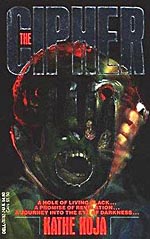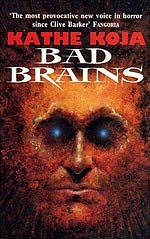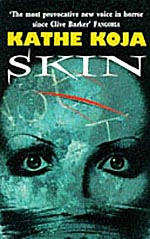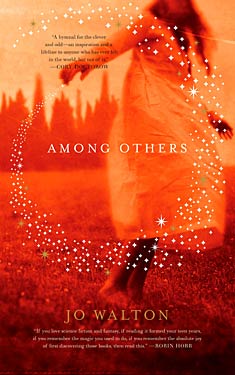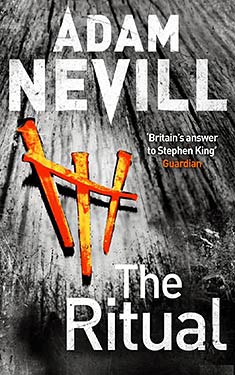The Horror! The Horror! – Kathe Koja
Guest Blogger and WWEnd Member, Charles Dee Mitchell, has contributed a great many book reviews to WWEnd including his extensive Philip K. Dickathon blog series. In this series Dee explores the darker side of genre fiction and it’s practitioners. Be sure to visit his blog www.potatoweather.blogspot.com for more genre goodness.
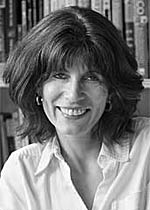 If I found a hole into another dimension in the utility closet of my dingy apartment building, I like to think I would contact either MIT or the Institute of Advanced Studies at Princeton. On the other hand, if I was either of the characters from Kathe Koja‘s The Cipher (1991), no, I would keep the discovery as the special plaything for myself and my really pretty awful girlfriend. Then all sorts of horrible and unfortunate things could happen, one of the worst being the appearance of a similar hole in the palm of my hand.
If I found a hole into another dimension in the utility closet of my dingy apartment building, I like to think I would contact either MIT or the Institute of Advanced Studies at Princeton. On the other hand, if I was either of the characters from Kathe Koja‘s The Cipher (1991), no, I would keep the discovery as the special plaything for myself and my really pretty awful girlfriend. Then all sorts of horrible and unfortunate things could happen, one of the worst being the appearance of a similar hole in the palm of my hand.
This is the set up for Kathe Koja’s debut novel The Cipher, one of the three horror novels she wrote in the early 1990’s before turning to YA fiction. I haven’t read the YA novels, but given the content of the three horror novels I have read, she had to make a serious turn to produce YA material. But the switch could do her good, possibly trimming some of the lugubrious fat from the prose of these earlier works. The Cipher, Bad Brains (1992), and Skin (1993) are overripe with grungy, sex-drenched prose, but they work. This is horror that infests a social setting where young people are making bad decisions that push their curiosity for all things dark and weird toward grotesque and tragic consequences.
Koja needs very little of the supernatural for her horror tales. The Cipher concerns what must be a scientific phenomenon that none of the wastrel art students who are dragged into the tale see any need to investigate beyond the fact that it is way cool and weird. In Bad Brains the hero suffers a blow to the head that leaves him with frontal lobe seizures and visions of a malevolent mass of the color silver. I knew that was going to sound ridiculous when I wrote it, but this mass of silver, which any reader is going to write off as a residual hallucination left over from the accident, is really bad news. Running around the country, drunk and stoned and hanging out with strippers, is probably not the best way to deal with it. When the story moves to the derelict home of a brujo in Michigan, the tragedy could be either purely psychological or the result of occult forces. And there is other weirdness that beggars logical explanation. The hero here is an artist, as are most of Koja’s characters. As he travels the northern Midwest, he gets reports from his dealer back home that the paintings he left in his charge are suddenly selling, but their new owners complain that the images begin to change after they get them on the wall.
Skin is Koja’s best novel and the one with the fewest traditional horror trappings. Koja never states a locale for her stories, but she is from Detroit, and a rundown Motorcity, with brutal winters and sweltering summers, seems a likely choice. Everyone is an artist of some sort. I don’t know anything about what the Detroit art scene might have been like in 1990, but none of her artists make anything that seems like it would be taken seriously as art. There is lots of fantasy painting and metal sculpture. But Skin brings in the world of transgressive performance that was an important presence at that time. Koja even credits Survival Research Laboratories and books published by ReSearch in her forward to this novel. Skin is a tale of young people pushing their bodies to ever greater extremes, staging illegal performances with battling machines, real blood, and moments of masochistic ecstasy. Unfortunately, people also die. Koja is not an outsider judging this scene. She chronicles her central character’s slide into madness with unflinching objectivity. The young artists in The Cipher play naively with forces they do not understand and bad things happen. In Skin the artists pursue a vision they will not relinquish even if it destroys them.
Koja’s horror novels are now out of print, but they did not go unnoticed when they first appeared. The Cipher was nominated for the Philip K. Dick Award and Skin was nominated for the World Fantasy Award. Her latest novel, Under the Poppy, is a sexy story set in a 19th century Belgian brothel. Reviews are good, it has won a couple of awards, and it is being adapted for the stage.
Click the book covers to read my reviews of the individual Koja novels.
20th Century Ghosts, by Joe Hill
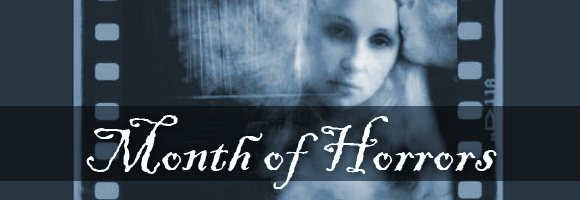
Joe Hill is, I think, a much better writer and storyteller than his father, Stephen King. While I enjoyed his novel Heart-Shaped Box, his earlier collection of short stories has a special kind of charm. Like any volume of short stories, 20th Century Ghosts has its hits and its misses, but even the imperfect tales are far more interesting than you would have any reason to expect. The book was published a few years before Hill was “outed” as Stephen King’s son, and while it’s not entirely fair to compare any artist to his close relations, it’s quite impossible to avoid. But as I said, I believe Hill comes out as the winner in the comparison. I have yet to read his second novel Horns, but I have little doubt it will be worthwhile.
Not every story found within is a horrific or even a darkly fantastic story, and according to Christopher Golden’s introduction some of them were written for literary magazines (a term Golden somehow finds despicable). But if the horror tales are not overly concerned with terror and fright to the exclusion of literary art, the literary tales have plenty of horror of their own.
WWEnd Grand Master Reading Challenge: September Review Poll
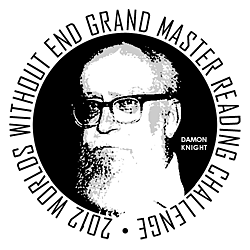 We featured 7 GMRC reviews in the blog for September and it’s time to cast your vote for the best.
We featured 7 GMRC reviews in the blog for September and it’s time to cast your vote for the best.
You don’t have to be a GMRC participant to vote and the poll will remain open until October 15th so you have plenty of time to read the ones you missed.
- The Legion of Space by Jack Williamson – (chuhl)
- Dragonsdawn by Anne McCaffrey – (valashain)
- A for Anything by Damon Knight – (CharlesDee)
- Ring Around the Sun by Clifford D. Simak – (ScottLaz)
- Stepsons of Terra by Robert Silverberg – (chuhl)
- The Computer Connection by Alfred Bester – (allie)
- Tau Zero by Poul Anderson – (triseult)
Winner gets the following:
- GMRC T-shirt – your choice of colors so long as it’s black
- GMRC button – you can never have too much flair
- Set of WWEnd Hugo Award bookmarks guaranteed to hold your place in any paper book.
- Book of your choice from the WWEnd bookshelf – winner gets a list of titles to pick from
- Everlasting Glory – So you’ll have that goin’ for ya. Which is nice.
Runners up will get a GMRC button and a set of bookmarks. Thanks to all our reviewers and good luck!
The Shirley Jackson Award
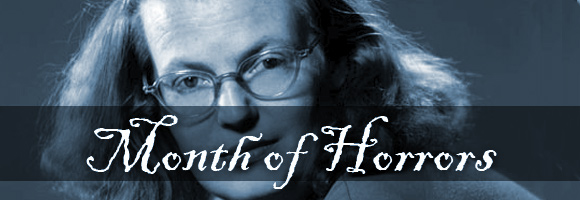
Just in time to kick of the Month of Horrors, we have added the Shirley Jackson Award to our awards list! We’re always on the lookout for ways to expand our book collection, and since Horror is the most recent genre addition to the site, our selection for it has been on the sparse side. Here’s how the Award runners describe themselves:
In recognition of the legacy of Shirley Jackson’s writing, and with permission of the author’s estate, the Shirley Jackson Awards have been established for outstanding achievement in the literature of psychological suspense, horror, and the dark fantastic.
Shirley Jackson (1916-1965) wrote such classic novels as The Haunting of Hill House and We Have Always Lived in the Castle, as well as one of the most famous short stories in the English language, “The Lottery.” Her work continues to be a major influence on writers of every kind of fiction, from the most traditional genre offerings to the most innovative literary work. National Book Critics Circle Award-winning novelist Jonathan Lethem has called Jackson “one of this century’s most luminous and strange American writers,” and multiple generations of authors would agree.
Go take a look at their site, and of course at our new award page.
2012 British Fantasy Awards
The 2012 British Fantasy Awards were presented yesterday, September 30th, at FantasyCon in Brighton, England. This year the award has been split into two awards in the best Novel category: The Robert Holdstock Award for best fantasy novel and The August Derleth Award for best horror novel.
The Robert Holdstock Award: Among Others by Jo Walton (Tor, 2011)
The August Derleth Award: The Ritual by Adam Nevill (Pan Macmillan, 2011)
See the complete list of winners in all categories on the BFS site. Congratulations to all the winners and nominees. Among Others has now won 3 out of the 5 awards it’s been nominated for including the Hugo and Nebula awards.
Month of Horrors 2012
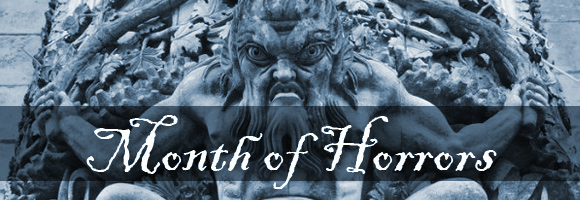
“I am forced into speech because men of science have refused to follow my advice without knowing why.”
–H.P. Lovecraft
There is something primal about fear. Primal in the sense of evoking a kind of bodily lurch in what is animal in ourselves, as primal as lust and wonder, and in that sense almost amoral. While the Science Fiction genre is tied to the mundane world as it is or as we think it likely to become, and Fantasy is tied to the world as we would like to imagine it to be, Horror is the only one of the three that goes for the gut. In fact, it is one of a few genres that have as their main purpose to inflame a certain emotion. Romance incites lust, Comic fiction incites hilarity, and Horror incites fear. That someone would intentionally seek out literature that incites lust or hilarity is not difficult to understand, but why fear? What do people get out of empathizing with the helpless teenager who is being stalked by a serial killer, or with the man contemplating the starry sky after learning that what he thought to be endless beauty was in fact an endlessly dark terror?
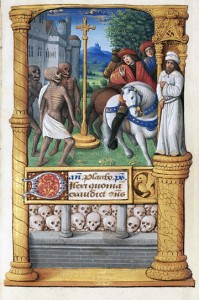 It is this element of empathy with the frightened protagonist that I think distinguishes the modern Horror tale from pre-modern tales of ghosts, monsters, and the undead. Earlier stories like that of the Three Living and Three Dead were morality tales meant to engender a holy fear unto repentance—a far cry from The Walking Dead. Fairy tales were sometimes written to scare little children, but not adults. Pagan myths about monsters read almost more like curiosities than exercises in fright. Science Fiction and Fantasy are both more intellectual: one playing with the rules of the world as it is, the other wondering what it would be like if the rules were otherwise. Horror is all about emotion, and if the reader never feels scared while reading something of this genre, it is perceived to be a failure of the form.
It is this element of empathy with the frightened protagonist that I think distinguishes the modern Horror tale from pre-modern tales of ghosts, monsters, and the undead. Earlier stories like that of the Three Living and Three Dead were morality tales meant to engender a holy fear unto repentance—a far cry from The Walking Dead. Fairy tales were sometimes written to scare little children, but not adults. Pagan myths about monsters read almost more like curiosities than exercises in fright. Science Fiction and Fantasy are both more intellectual: one playing with the rules of the world as it is, the other wondering what it would be like if the rules were otherwise. Horror is all about emotion, and if the reader never feels scared while reading something of this genre, it is perceived to be a failure of the form.
So why do we bother with fictional fear? Isn’t the real world scary enough? Well, yes and no. There are many things to be frightened about in the world, perhaps even more so than in earlier, less technological ages, but the world we live in is oddly sanitized. Fears that high-level government and economic leaders are acting together against the common good are dismissed as nutty conspiracy theories. Fears that our loved ones will be hurt by what seem to be the increasingly evil people that populate our societies are contained in the therapist’s office. Fears about the afterlife are shrugged off by socially polite agnosticism. Fears about death are minimized by painkillers, euthanasia, sentimental funerals, and an avoidance of cemeteries. (Have you ever just visited a cemetery for the sake of the experience? People think you’re a goth nut on the hunt for poetic inspiration.) We repress our natural fears, but they cannot be denied forever. Horror novels and films are as socially acceptable a conduit as any for allowing oneself to truly feel fear.
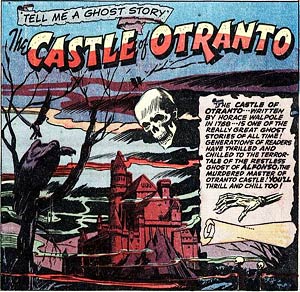 The need for a Horror genre, or something like it, is very Freudian. It serves a psychological need that could perhaps be best sated by living a better kind of life, but which can be bandaged by slasher movies in a tight fix. The best Horror writers understand this need and exploit it without exploiting their readers (unlike Romance writers, who all exploit their readers). I expect we have our fair share of exploitive and “gross-out” Horror fiction on WWEnd, but unfortunately we’re still so ignorant about the genre around here that we honestly couldn’t tell which novel is which.
The need for a Horror genre, or something like it, is very Freudian. It serves a psychological need that could perhaps be best sated by living a better kind of life, but which can be bandaged by slasher movies in a tight fix. The best Horror writers understand this need and exploit it without exploiting their readers (unlike Romance writers, who all exploit their readers). I expect we have our fair share of exploitive and “gross-out” Horror fiction on WWEnd, but unfortunately we’re still so ignorant about the genre around here that we honestly couldn’t tell which novel is which.
The purpose of Month of Horrors is to explore this genre a little more, to feel out its architecture and boundaries. Scott Lazerus did us a great service back in April by exploring the roots of the Gothic sub-genre. Rico will be writing about the origins and influence of Mary Shelley’s Frankenstein as October goes on. I will be reviewing whatever books I can get my hands on and finish before the month is out.
And of course we hope to feature your Horror novel reviews throughout the month, so get busy writing!



















 Full Details
Full Details
